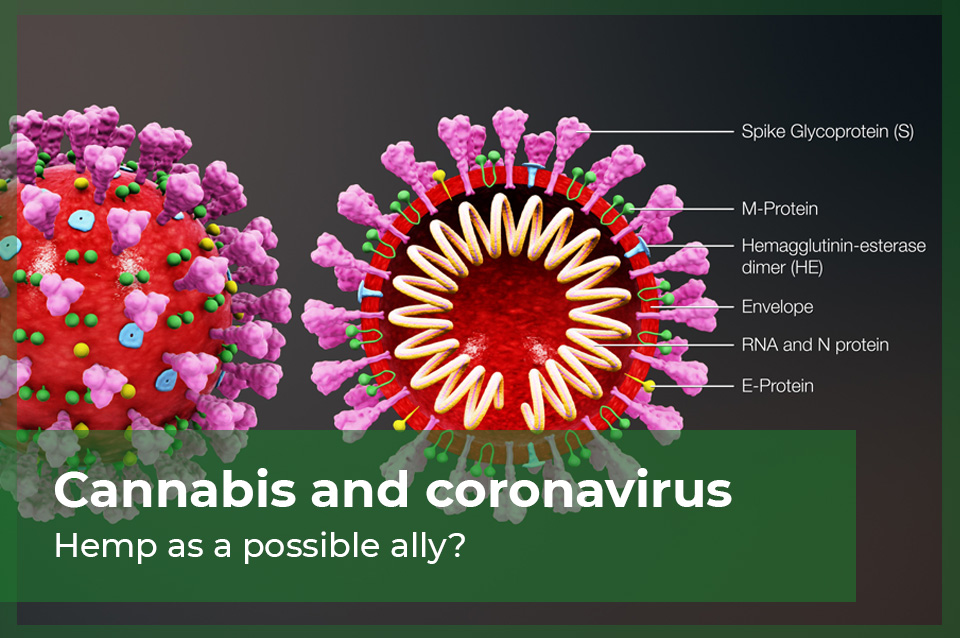Coronavirus
COVID-19, also known as SARS-CoV-2 acute respiratory disease, is a viral infection caused by the SARS-CoV-2 virus (severe acute respiratory syndrome coronavirus 2).
Known as the coronavirus, due to some glycoproteins present on the outer membrane of the virus, which, seen under a microscope, make it look like a crown.
It is a recent virus, of which many features are still unknown. The main symptoms are flu-like, with loss of taste / smell, gastrointestinal problems, high inflammatory response, up to more serious diseases such as acute respiratory syndromes, thrombosis, sepsis and multi-organ failure.
Trials of different therapies are underway, which aim both to eradicate the virus (antivirals, antimicrobials, antiseptics) or to prevent it (vaccines, antibodies), and to limit its undesirable effects (anti-inflammatory, anticoagulants).
Cannabis
Active ingredients, terpenes, methods of consumption
Cannabis contains more than 400 active ingredients, belonging to different classes, including cannabinoids, terpenes, polyphenols.
Each of these substances differs from the others in effects and mechanism of action.
In principle, cannabinoids share a relaxing and anti-inflammatory effect, terpenes an antiseptic, antifungal, antimicrobial action, polyphenols an antioxidant and support effect.
Fake news
First of all, we need to clarify one thing: cannabis is not the cure for Coronavirus.
Various fake news without scientific basis circulate on the web, including that the molecule to cure the coronavirus was CBD, or that, in based on unspecified studies, THCV would have completely eradicated the virus. None of this is true and, despite its many uses and beneficial effects, cannabis is not the panacea for all ills, so it is right to disprove the false reports that risk compromising public health.
In fact, the same IACM (International Association Cannabis Medica) wanted to reiterate with a dry statement that despite numerous laboratory studies indicate possible antiviral effects and antibacterial cannabinoids, there is no scientific evidence that protect against SARS-CoV2 virus infections or that can be used for effectively treat COVID-19.
It should also be remembered that internationally the advice not to pass the pipes as well as tools such as pipes or bongs has been passed, to prevent the spread of the virus. Also, it is best to avoid places like Dutch coffee shops or Spanish cannabis clubs, where it is not uncommon to find people who cough, precisely because they smoke. Among other things, for those who are positive for Coronavirus, smoking is an aggravating circumstance, because it helps to irritate the lung, making the situation worse.
Hemp as an ally
Hoax aside, it is equally important to emphasize the benefits that can be derived from the use of cannabis as an adjuvant, through vaporization or ingestion:
- Some terpenes contained in it have mild antibacterial and antiviral properties, useful for decreasing / containing the infection;
- Most cannabinoids have immunomodulatory and anti-inflammatory properties, which can placate a excessive immune response, such as sepsis;
- Several polyphenols have an antioxidant and thinning effect on the blood, limiting uncoordinated clotting and free radicals resulting from the stress of convalescence;
Hemp fabrics and masks
In addition to the usefulness of the active ingredients present in the flower, other parts of the cannabis plant can also be very useful at this time: the fiber, defined as “raffia” because it is obtained from the stem. Hemp is a very ancient crop, cultivated by man for over 10,000 years, and therefore the advantages of hemp fiber have long been known:
- It is waterproof and therefore suitable to avoid the formation of microorganisms inside the fabric obtained;
- It is biocompatible, biodegradable and eco-sustainable;
- It is stable in the time even after multiple washes at high temperatures;
- It has antibacterial and antifungal properties, both for the active ingredients contained, and for the high transpiration;
- Some tests show how a mixture of hemp and viscose, unlike cotton and synthetics, has the ability to kill some bacteria on the surface and limit their spread, including staphylococcus (aureus and MRSA) and Klebsiella pneumoniae;
- Absorbs infrared and UVA rays up to 95%, making it easily sterilizable;
- Regulates body humidity and provides a sensation of coolness in summer and warmth in winter;
- Cannabinoids present in the hemp fiber & nbsp; reduce cell bioavailability by increasing the impermeability of the membrane & nbsp; and cells themselves;
Hemp and hand sanitizer
Many studies are underway regarding the ability of some cannabinoids to cope with the methicillin-resistant staphylococcus aureus (MRSA) bacterium and reduce its attack on human skin.
A consequence of the research on these antibacterial properties is the possibility of making cosmetics and personal hygiene products free of preservatives and synthetic antibacterials, potentially harmful to the environment and to health. Milan is developing a new sanitizing gel that will be based on hemp and not on alcohol, but only the efficacy tests will be able to indicate its possible use. However, even without upsetting the sanitized devices already available in this way, the addition of some hemp-based ingredients would certainly bring valuable help.
Bibliography
- https://www.canapainfopoint.it/canapa-e-coronavirus-in-arrivo-ligienizzante-mani-alla-canapa/
- https://www.canapainfopoint.it/coronavirus-arrivano-le-mascherine-in-canapa/
- https://canapaindustriale.it/2014/06/10/studi-scientifici-per-le-applicazioni-antibatteriche-della-canapa/
- https://www.naturellementchanvre.com/it/4-tessile-tela-di-canapa
- https://www.naturalogico.it/tutte-le-fibre-ecologiche/
- https://dress-ecode.com/2019/04/03/canapa-e-davvero-una-fibra-sostenibile-da-introdurre-nel-nostro-armadio-piu-responsabile/
- https://www.royalqueenseeds.it/blog-canapa-e-cotone-qual-e-il-tessuto-migliore-n1087
- https://www.dolcevitaonline.it/ufaqs/quali-sono-i-vantaggi-dei-tessuti-di-canapa/
- https://www.architetturaecosostenibile.it/materiali/altri/tessuti-naturali-arredamento-408
- https://www.tetralight.it/canapa-proprieta-e-campi-di-impiego/
- https://www.fuoriluogo.it/mappamondo/fake-news-cannabis-coronavirus-iacm/#.XqgC6_gzZdg
- https://www.fanpage.it/attualita/no-la-cannabis-non-cura-il-coronavirus/
- https://droghe.aduc.it/notizia/coronavirus+cannabis+terapeutica_136832.php
- https://www.adnkronos.com/fatti/politica/2020/02/28/coronavirus-considerare-cannabis-terapeutica-possibile-antidoto_l0MBLjTNURxyX9XFPQ2HIM.html?refresh_ce
- https://canapaindustriale.it/2013/06/26/tessuti-di-canapa-per-uccidere-i-batteri-e-per-scopi-militari/

